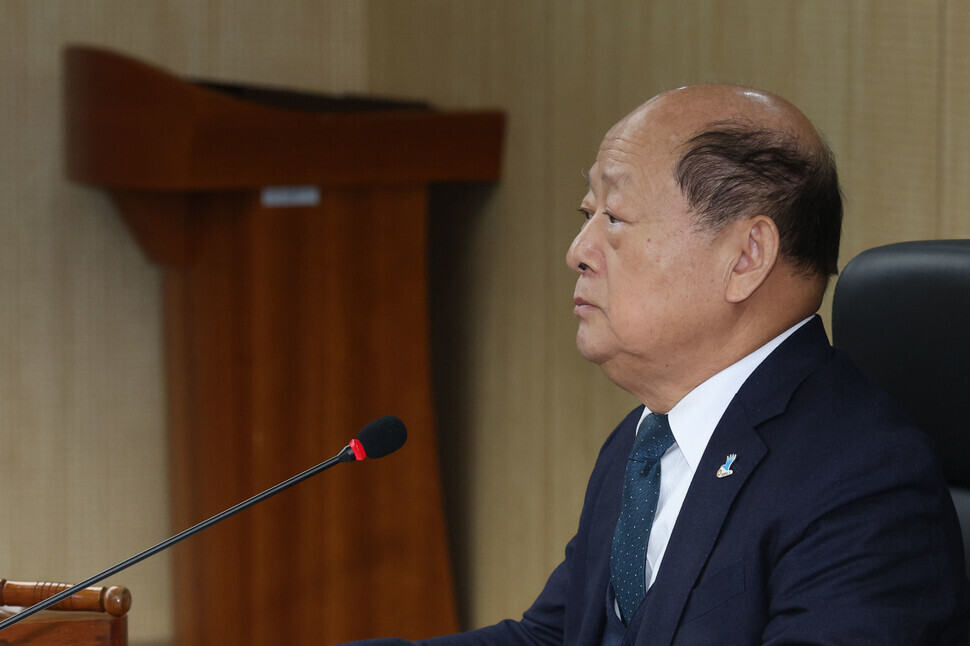hankyoreh
Links to other country sites 다른 나라 사이트 링크
Case of trafficked foreign women being treated as criminals in Korea draws UN attention

Song Doo-hwan, the chairperson of the National Human Rights Commission of Korea (NHRCK), issued a statement on Monday urging the government to fully implement the recommendations of the UN Committee on the Elimination of Discrimination against Women (CEDAW) in relation to a complaint filed on Nov. 24 by three foreign nationals who were victims of human trafficking in South Korea.
The case began when the three foreign nationals entered South Korea on entertainment visas after being hired as singers in 2014 and were forced to work as employees in a nightclub, contrary to their labor contract. They filed a complaint with the UN treaty body on women’s rights, alleging that they suffered as victims of sexual exploitation and forced prostitution, as well as physical and psychological violence.
The women also claimed that the Korean government violated their rights under the Convention on the Elimination of All Forms of Discrimination against Women by failing to protect them as victims, instead secondarily victimizing them by not only investigating them on prostitution charges, but also detaining them in an immigration detention facility.
After reviewing the complainants’ submissions and the comments made by the Korean government, CEDAW concluded that the state party had violated these women’s rights under the convention and recommended that it provide full reparation to the complainants, investigate and prosecute the perpetrators of trafficking, and adopt a victim-centered and human rights-based approach to these issues.
The committee found that the complainants were treated as criminals rather than victims. “According to the information brought before us, there were many signs of trafficking, such as confiscation of their passports, fear of the club owner, and the E-6-2 visa, that the police and the immigration officers knew of and should have recognized,” said Corinne Dettmeijer-Vermeulen, an expert member of CEDAW, in a press release on the case.
In particular, the committee noted the complainants’ allegations that the police investigation “focused on their engagement in prostitution rather than on their vulnerabilities and the violations committed against them, while the courts emphasized the lack of complete physical confinement rather than analyzing circumstantial evidence suggesting a highly coercive and threatening environment.”
The committee emphasized that “stereotypical views applied by the police and courts about the behavior of trafficked victims prevented the identification of the authors [of the complaint] as victims of trafficking for the purposes of sexual exploitation.”
CEDAW requested that the decision on the case be translated into Korean, published and distributed, and that the Korean government provide information in writing within six months on all measures taken to implement the recommendations.
“The recommendations of the UN CEDAW are in line with the recommendations and observations that the National Human Rights Commission has made to the government to protect victims of trafficking and to combat trafficking in persons,” the NHRCK said.
“Trafficking in persons is a serious human rights violation, and the government has a responsibility to prevent such crimes, punish perpetrators, and provide protection and assistance to victims.”
By Koh Kyoung-tae, senior staff writer
Please direct questions or comments to [english@hani.co.kr]

Editorial・opinion
![[Column] When ‘fairness’ means hate and violence [Column] When ‘fairness’ means hate and violence](https://flexible.img.hani.co.kr/flexible/normal/500/300/imgdb/original/2024/0516/7417158465908824.jpg) [Column] When ‘fairness’ means hate and violence
[Column] When ‘fairness’ means hate and violence![[Editorial] Yoon must stop abusing authority to shield himself from investigation [Editorial] Yoon must stop abusing authority to shield himself from investigation](https://flexible.img.hani.co.kr/flexible/normal/500/300/imgdb/original/2024/0516/4417158464854198.jpg) [Editorial] Yoon must stop abusing authority to shield himself from investigation
[Editorial] Yoon must stop abusing authority to shield himself from investigation- [Column] US troop withdrawal from Korea could be the Acheson Line all over
- [Column] How to win back readers who’ve turned to YouTube for news
- [Column] Welcome to the president’s pity party
- [Editorial] Korea must respond firmly to Japan’s attempt to usurp Line
- [Editorial] Transfers of prosecutors investigating Korea’s first lady send chilling message
- [Column] Will Seoul’s ties with Moscow really recover on their own?
- [Column] Samsung’s ‘lost decade’ and Lee Jae-yong’s mismatched chopsticks
- [Correspondent’s column] The real reason the US is worried about Chinese ‘overcapacity’
Most viewed articles
- 1China calls US tariffs ‘madness,’ warns of full-on trade conflict
- 2[Column] US troop withdrawal from Korea could be the Acheson Line all over
- 3[Column] When ‘fairness’ means hate and violence
- 4Could Korea’s Naver lose control of Line to Japan?
- 5[Editorial] Yoon must stop abusing authority to shield himself from investigation
- 6Naver’s union calls for action from government over possible Japanese buyout of Line
- 7[Column] How to win back readers who’ve turned to YouTube for news
- 8[Column] Welcome to the president’s pity party
- 9DongA Ilbo and the government are told to apologize for past civil rights violations
- 10US has always pulled troops from Korea unilaterally — is Yoon prepared for it to happen again?